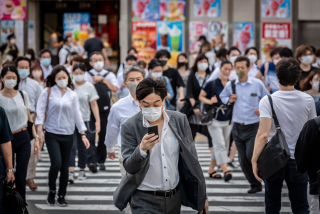Advice Is One Thing, Bashing Another
- Share via
Remember that U.S. recession earlier this decade, when some blowhard politicians and even some ordinary Americans were hyperventilating about Japan? Well, before long, Japan-bashing may be back in fashion.
Even now, some Japanese are getting irritated with all the criticism, in the United States and elsewhere, that they are not doing enough about the Asian financial crisis. Recently an official in the Hashimoto government whom I greatly respect wrote me to complain about a column of mine that called on Tokyo to do more. We are already doing a lot, he said, adding that Americans should respect the efforts of Prime Minister Ryutaro Hashimoto, noting his sojourn to Indonesia where the prime minister sought to persuade Suharto, in the polite Asian way, to clean up his act. The official pointedly noted that, while the U.S. government has sent high-level delegations to try to soften up Suharto, only Japan has sent its top man.
Said this foreign ministry official, speaking for himself but expressing a widely held view in the government: “There seems to be a stereotyped myth,” he wrote me, “that only the U.S. alone has the will and the sense of mission capable of squarely confronting any kind of international crisis. I don’t dispute the integrity and leadership of the U.S., which is so vital, and without which any viable solution is simply a castle in the air. But it is a fact that the U.S. government and the media tend to underestimate the efforts of its ally Japan as part of a coordinated effort to convince Suharto to honor his word. This sort of thoughtfulness is not just the Asian way, but is a universally viable technique if we (U.S., Japan, IMF) hope to succeed.”
Not everyone in America takes an unappreciative view of Japan, of course. Indeed, one premier U.S. economist, Stanford’s Lawrence J. Lau, believes that many criticisms are misconceived and divert attention from Japan’s underlying strengths, such as that giant economy’s special status as the world’s largest net creditor nation. Speaking at a UCLA Center for International Relations/Center for Pacific Rim Studies seminar last week, Lau allowed that Japan’s secretive banking ways are far from ideal. But, he added, “this is not something that causes recessions. On a net basis, Japan is way ahead in the positive column. When a country does not need to borrow much abroad [as did Korea, Indonesia and Thailand], the lack of transparency does not matter too much.” Lau also believes that even if Japan falls into serious recession (“but it will probably muddle through OK”), America will not seriously suffer--except, of course, on the West Coast. Lau speaks with special authority: He was one of the economists to have anticipated Asia’s problems, in his 1995 paper “Is There a Next Mexico in East Asia?”
But if he is wrong this time--if the trade deficit continues to soar, Japan sputters even more and the U.S. economy does brake--Americans will probably look for someone to blame. And they may very well indict Japan for the offense of not restimulating its own economy to avoid recession and to help pull up other Asian nations by importing more of their goods. They may forget that the list of culprits is quite long, including Thailand, where this mess all started, and in fact the United States, which should have responded more quickly to Bangkok’s pleas last summer to cool off the currency speculation that then spread elsewhere in Asia. But America has never been adverse to Japan-bashing, a poison not far beneath our surface.
Sadly, if the finger-pointing does bubble back up, more than trans-Pacific feelings may be hurt; also damaged, perhaps this time severely, will be the U.S.-Japan relationship, the linchpin of security in Asia. This is why serious people on both sides of the Pacific need to promote a new, thoughtful U.S.-Japan dialogue. “It really would be useful to have this dialogue broadened,” says Paul H. Boeker, president of the San Diego-based Institute of the Americas, which is monitoring the effect of the Asian crisis on Latin America. “The great intellectuals from both countries need to get involved, to see how Japan can produce more growth and show more leadership. But I must add that I’ve been struck by all of Japan’s pretensions as to being the den mother of Asia,” when, he agrees with the critics, it has not been doing enough: “But saying this critically of Tokyo doesn’t make us bashers. That’s just the way it is.”
But it is also true that we in America have to develop the capacity to speak to the Japanese as peers, which of course they are, not as students who deserve a good long lecture. There’s a nice but effective way to say almost everything, and Americans need to learn that lesson if we want Japan to listen. Which it really must.
More to Read
Sign up for Essential California
The most important California stories and recommendations in your inbox every morning.
You may occasionally receive promotional content from the Los Angeles Times.













